I have OpenStreetMap data loaded to a PostgreSQL table. A hstore type column contains all of the tags. I would like to make a comparison chart to see how many records has name, name:en, name:bg tags for example. The result I would like to see is something like this:
I can achieve this manually using this query:
SELECT 1 AS id, '+' AS name, NULL AS "name:en", NULL AS "name:bg", count(*) FROM public.ways WHERE exist(tags,'name') UNION
SELECT 2 AS id, NULL AS name, '+' AS "name:en", NULL AS "name:bg", count(*) FROM public.ways WHERE exist(tags,'name:en') UNION
SELECT 3 AS id, NULL AS name, NULL AS "name:en", '+' AS "name:bg", count(*) FROM public.ways WHERE exist(tags,'name:bg') UNION
SELECT 4 AS id, '+' AS name, '+' AS "name:en", NULL AS "name:bg", count(*) FROM public.ways WHERE exist(tags,'name') AND exist(tags,'name:en') UNION
SELECT 5 AS id, '+' AS name, NULL AS "name:en", '+' AS "name:bg", count(*) FROM public.ways WHERE exist(tags,'name') AND exist(tags,'name:bg') UNION
SELECT 6 AS id, '+' AS name, '-' AS "name:en", NULL AS "name:bg", count(*) FROM public.ways WHERE exist(tags,'name') AND NOT exist(tags,'name:en') UNION
SELECT 7 AS id, '-' AS name, '+' AS "name:en", NULL AS "name:bg", count(*) FROM public.ways WHERE NOT exist(tags,'name') AND exist(tags,'name:en')
ORDER BY id
I consider this unnecessarily long and overcomplicated, plus I have to do it manually. I know there are some possibilities using the crosstab function, but I couldn't get it working. Based on the answer to this question I was able to create something like this:
SELECT * FROM crosstab(
'SELECT tags::text~''"name"=>".*"'' as a, tags::text~''"name:en"=>".*"'' as b, tags::text~''"name_int"=>".*"'' as c FROM public.ways')
AS ct (name boolean,"name:en" boolean, "name:bg" boolean)
GROUP BY name,"name:en","name:bg"
My problem is that I cannot seem to add a count column to this, and that it does not contain options where only one of the three condition is taken into account.
Any idea how could I solve this problem, or any direction where should I start?
Example data lines:
1 "name"=>"dm"
2 "name"=>"Ешекчи дере", "name:en"=>"Khatak Dere River"
3 "name:en"=>"Sushitsa"
4 "name"=>"Слънчева", "name:bg"=>"Слънчева", "name:en"=>"Slantcheva"

